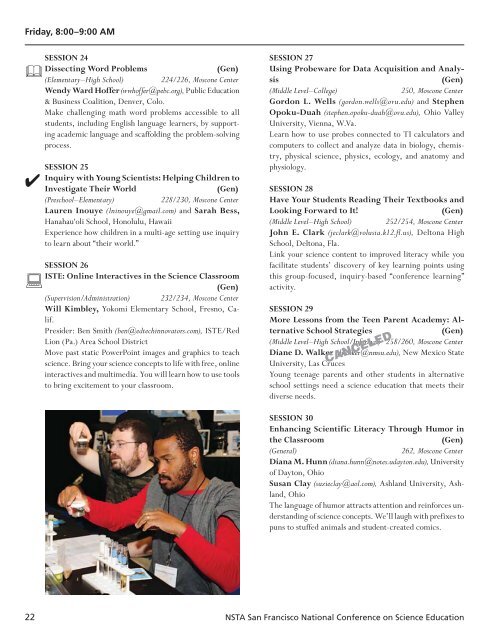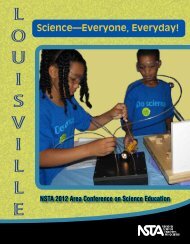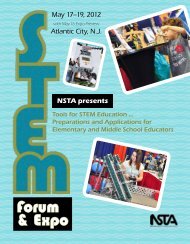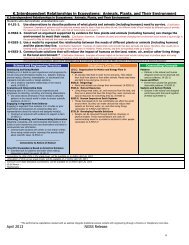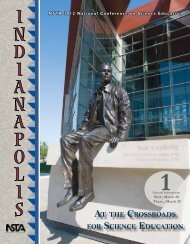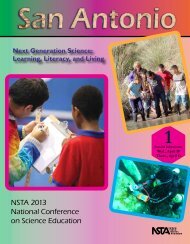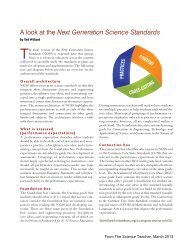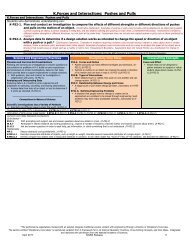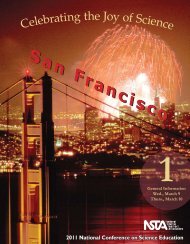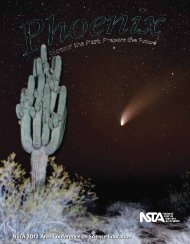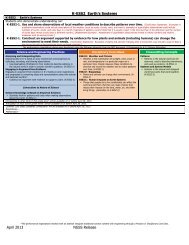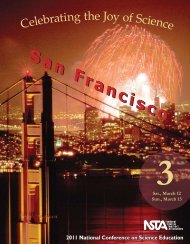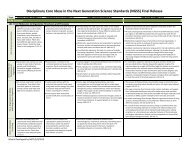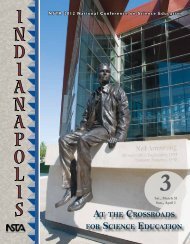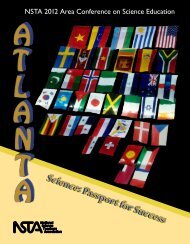San Francisco Program, Vol. 2: Friday - National Science Teachers ...
San Francisco Program, Vol. 2: Friday - National Science Teachers ...
San Francisco Program, Vol. 2: Friday - National Science Teachers ...
You also want an ePaper? Increase the reach of your titles
YUMPU automatically turns print PDFs into web optimized ePapers that Google loves.
<strong>Friday</strong>, 8:00–9:00 AM<br />
<br />
✔<br />
<br />
SESSION 24<br />
Dissecting Word Problems<br />
(Gen)<br />
(Elementary–High School) 224/226, Moscone Center<br />
Wendy Ward Hoffer (wwhoffer@pebc.org), Public Education<br />
& Business Coalition, Denver, Colo.<br />
Make challenging math word problems accessible to all<br />
students, including English language learners, by supporting<br />
academic language and scaffolding the problem-solving<br />
process.<br />
SESSION 25<br />
Inquiry with Young Scientists: Helping Children to<br />
Investigate Their World<br />
(Gen)<br />
(Preschool–Elementary)<br />
228/230, Moscone Center<br />
Lauren Inouye (lninouye@gmail.com) and Sarah Bess,<br />
Hanahau‘oli School, Honolulu, Hawaii<br />
Experience how children in a multi-age setting use inquiry<br />
to learn about “their world.”<br />
SESSION 26<br />
ISTE: Online Interactives in the <strong>Science</strong> Classroom<br />
(Gen)<br />
(Supervision/Administration) 232/234, Moscone Center<br />
Will Kimbley, Yokomi Elementary School, Fresno, Calif.<br />
Presider: Ben Smith (ben@edtechinnovators.com), ISTE/Red<br />
Lion (Pa.) Area School District<br />
Move past static PowerPoint images and graphics to teach<br />
science. Bring your science concepts to life with free, online<br />
interactives and multimedia. You will learn how to use tools<br />
to bring excitement to your classroom.<br />
SESSION 27<br />
Using Probeware for Data Acquisition and Analysis<br />
(Gen)<br />
(Middle Level–College)<br />
250, Moscone Center<br />
Gordon L. Wells (gordon.wells@ovu.edu) and Stephen<br />
Opoku-Duah (stephen.opoku-duah@ovu.edu), Ohio Valley<br />
University, Vienna, W.Va.<br />
Learn how to use probes connected to TI calculators and<br />
computers to collect and analyze data in biology, chemistry,<br />
physical science, physics, ecology, and anatomy and<br />
physiology.<br />
SESSION 28<br />
Have Your Students Reading Their Textbooks and<br />
Looking Forward to It!<br />
(Gen)<br />
(Middle Level–High School) 252/254, Moscone Center<br />
John E. Clark (jeclark@volusia.k12.fl.us), Deltona High<br />
School, Deltona, Fla.<br />
Link your science content to improved literacy while you<br />
facilitate students’ discovery of key learning points using<br />
this group-focused, inquiry-based “conference learning”<br />
activity.<br />
SESSION 29<br />
More Lessons from the Teen Parent Academy: Alternative<br />
School Strategies<br />
(Gen)<br />
(Middle Level–High School/Informal) 258/260, Moscone Center<br />
Diane D. Walker (dwalker@nmsu.edu), New Mexico State<br />
University, Las Cruces<br />
Young teenage parents and other students in alternative<br />
school settings need a science education that meets their<br />
diverse needs.<br />
CANCELED<br />
SESSION 30<br />
Enhancing Scientific Literacy Through Humor in<br />
the Classroom<br />
(Gen)<br />
(General)<br />
262, Moscone Center<br />
Diana M. Hunn (diana.hunn@notes.udayton.edu), University<br />
of Dayton, Ohio<br />
Susan Clay (suzieclay@aol.com), Ashland University, Ashland,<br />
Ohio<br />
The language of humor attracts attention and reinforces understanding<br />
of science concepts. We’ll laugh with prefixes to<br />
puns to stuffed animals and student-created comics.<br />
22 NSTA <strong>San</strong> <strong>Francisco</strong> <strong>National</strong> Conference on <strong>Science</strong> Education


